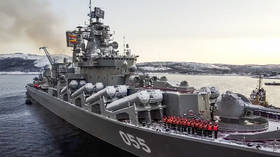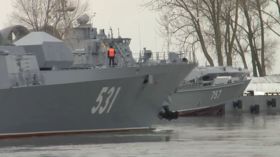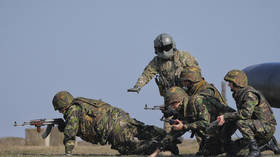Russia replies to Irish fishermen

The Russian Embassy in Dublin has confirmed that Moscow has decided to move naval drills, scheduled for next week, following a request from the Irish government.
In a statement, issued on Saturday evening, Ambassador Yury Filatov said the planned military exercise will now take place outside of Ireland’s Exclusive Economic Zone.
Earlier on Saturday, Minister Simon Coveney, whose brief extends to both Ireland’s foreign affairs and defense ministries, revealed that he'd personally asked his Russian counterpart Sergey Shoigu to reconsider the location of the drills.
“This evening I received a letter confirming the Russian exercises will be relocated outside of Ireland’s EEZ. I welcome this response,” Coveney wrote.
This week I wrote to my counterpart, the Minister of Defence of Russia, to request a reconsideration of naval exercises off the Irish coast. This evening I received a letter confirming the Russian exercises will be relocated outside of Ireland’s EEZ. I welcome this response.
— Simon Coveney (@simoncoveney) January 29, 2022
Filatov called the move of the exercises a “gesture of goodwill” in Saturday’s statement and said moving outside the zone was done with “the aim not to hinder fishing activities by the Irish vessels in the traditional fishing areas.”
Ireland has previously protested the planned drills, saying they were not “welcome” and citing tensions around Ukraine as the supposed reason the maneuvers were unwanted in its EEZ. Dublin had admitted it had no authority to prevent the military drills, which were set to take place on international waters, 240 kilometers (150 miles) off the southwest coast of Ireland.
Irish fishing representatives held what was described as a “very positive” meeting with Filatov on Thursday, following threats amplified by the media that some fishermen would try to disrupt the drills. During this meeting in Dublin the two sides agreed on a 60- to 80-kilometer (37- to 49-mile) buffer zone between the fishing boats and the Russian warships.
Russia’s live-fire drills in the Atlantic are part of large-scale naval exercises which will be taking place in several regions of the world. They will include over 140 warships and support vessels, as well as approximately 10,000 participating troops.
Moscow has been facing Western allegations of a having plans for a military invasion of Ukraine, which the Russian government has denied as “fake news.” In turn, the Kremlin has blamed the US-led NATO military bloc for increasing tensions in Europe by trying to absorb the former Soviet states next to the Russian border and deploying troops and weapons to eastern Europe in particular. Moscow has proposed to agree on a veto for NATO membership of such countries as Ukraine and Georgia, citing documented Western promises of non-expansion into the former nations of the Warsaw Pact. Not only does NATO deny such promises were made, it has refused out of hand to consider such demands, citing its “open-door” policy.
However, after Washington called the alleged Russian invasion “imminent,” Ukrainian officials have asked Western media to tone down the “panic” over Russian troop movements, suggesting these were not necessarily a sign of an inevitable military conflict.














